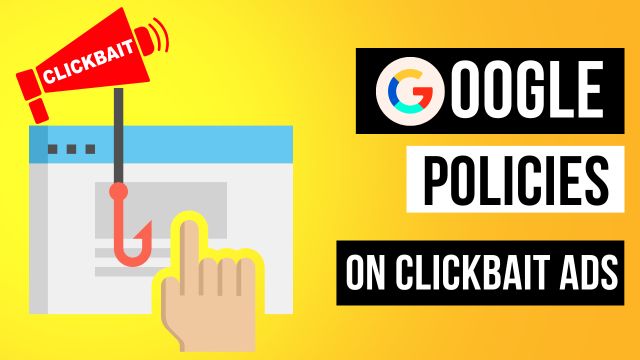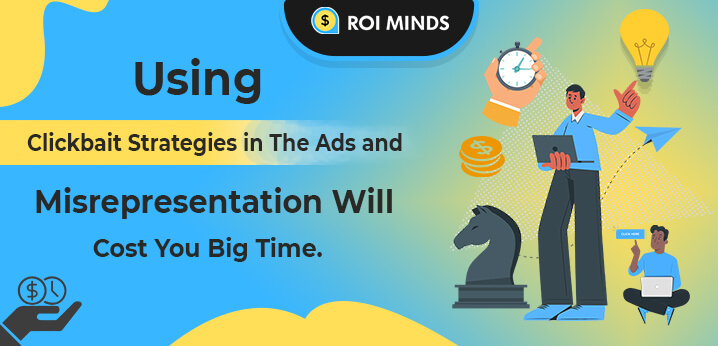Google’s primary goal is to provide valuable information to its users. Unfortunately, some individuals resort to clickbait strategies and sensationalist language in their ads, leading users astray. Often, this information is exaggerated, leaving users disappointed and unsatisfied.
Digital advertising plays a crucial role in ensuring billions of people worldwide have access to reliable and high-quality information online. However, certain individuals have misused digital advertising platforms by creating clickbait ads. To address this issue, Google updated its Misrepresentation and Clickbait policies on July 15, 2020, to safeguard users’ experiences from misleading information.
For Google’s official update on this matter, you can visit the following link. Don’t worry; we will go through these policies together to help you prevent your account from being suspended.
Google’s Policies on Clickbait Ads

Google strictly prohibits the use of clickbait ads that include or claim:
- Ads that promise to reveal secrets, scandals, or sensationalist information about the advertised product or service.
- Ads that employ clickbait messaging such as “Click here to find out,” “You won’t believe what happened,” and similar phrases, entice users to click on the ad for full context.
- Ads that use manipulated or zoomed-in body parts, mugshots, and real-life accident or disaster photos to promote a product or service.
- Ads that utilize “before and after” images to promote drastic alterations to the human body.
(Source: www.lexology.com)
Are you aware of the hidden dangers lurking behind clickbait strategies and misrepresentation in advertisements? At ROI Minds, we delve deep into the repercussions of these deceptive tactics that can lead to significant consequences. Join us on a captivating journey to uncover the truth and understand why it’s crucial to steer clear of such practices.
1: The Impact on User Experience
Imagine clicking on an enticing ad, only to be bombarded with exaggerated claims and a lack of substantial information. Google, as a prominent search engine, understands the importance of providing valuable content to its users. That’s why they have taken decisive action against clickbait ads and misleading representations. In this section, we explore the negative impact on user experience caused by clickbait strategies and misrepresentation, highlighting the frustration and disappointment it brings to users seeking genuine information.
2: Google’s Updated Policies
On July 15, 2020, Google introduced stringent measures to combat misleading information and clickbait. We provide an in-depth analysis of these policies to help you navigate the ever-evolving digital advertising landscape successfully. Learn about the specific guidelines put in place by Google to tackle clickbait ads and the steps they have taken to ensure a fair and transparent online environment.
3: Unveiling the Clickbait Tactics
Discover the clickbait strategies that Google categorically prohibits. We shed light on ads that make outrageous claims, employ sensationalist language, or use manipulative imagery. By understanding these tactics, you can ensure your ads remain ethical, trustworthy, and captivating. Dive into a comprehensive exploration of clickbait tactics, their psychological impact on users, and the importance of maintaining integrity in your advertising campaigns.
4: The Ramifications of Misrepresentation
Misrepresentation is a grave offence in the world of online advertising. We examine the unacceptable practices, coordinated deceptive strategies, and misleading representations that can put your business at risk. Gain valuable insights on how to maintain transparency and build credibility with your audience. Understand the potential legal consequences and damage to your brand’s reputation that can arise from engaging in deceptive advertising practices.
5: Responsible Advertising Practices
At ROI Minds, we believe in fostering a responsible digital advertising ecosystem. We provide a comprehensive guide on how to create engaging ads without resorting to clickbait or misrepresentation. Discover proven techniques to captivate your audience while delivering genuine value. Learn about ethical advertising strategies, including creating compelling content, accurately representing your products or services, and building long-term relationships with your customers.
6: Consequences and Warnings
Google doesn’t take violations lightly. We outline the potential consequences of breaching their policies and emphasize the importance of adhering to ethical advertising practices. Learn about the warning system implemented by Google to ensure a fair and transparent process. Understand the steps you can take to rectify any policy violations and rebuild trust with Google and your audience.
7: Building a Culture of Trust and Authenticity
In the era of digital advertising, it is paramount to prioritize authenticity, transparency, and user satisfaction. By avoiding clickbait strategies and misrepresentation, you can safeguard your reputation, build trust with your audience, and contribute to a more reliable online environment. We delve into the benefits of adopting a trustworthy and ethical advertising approach and offer insights on how to foster a culture of trust within your organization.
8: Navigating the Evolving Landscape of Digital Advertising
The digital advertising landscape is constantly evolving, and staying up-to-date with the latest trends and best practices is essential. In this section, we delve into emerging advertising strategies that prioritize authenticity and user engagement. Explore innovative approaches such as native advertising, influencer marketing, and personalized targeting to create meaningful connections with your target audience.
9: Balancing Creativity and Ethical Advertising
Creativity is the lifeblood of effective advertising, but it should never come at the cost of ethical standards. We explore the delicate balance between captivating ad campaigns and maintaining integrity. Discover how you can infuse creativity into your advertising efforts while ensuring transparency, honesty, and respect for your audience.
10: The Future of Ethical Advertising
As technology continues to advance, the future of advertising holds immense potential. In this section, we discuss the importance of responsible AI implementation, data privacy, and consumer empowerment. Explore the role of ethical advertising in building sustainable customer relationships and creating a positive impact on society as a whole.
11: Learning from Real-World Examples
Incorporating real-world examples is a powerful way to understand the impact of clickbait strategies and misrepresentation in ads. We analyze notable cases where companies faced severe consequences due to unethical advertising practices. By examining these examples, you can gain valuable insights and learn from the mistakes of others.
Conclusion
In the world of digital advertising, the effects of clickbait and misleading ads are significant. At ROI Minds, we are passionate about promoting ethical advertising practices. By understanding how these tactics impact users, following Google’s guidelines, and embracing responsible advertising, you can safeguard your brand’s reputation, build trust with your audience, and contribute to a more genuine and transparent online environment.
Join us on this enlightening journey as we uncover the hidden risks associated with clickbait and misleading ads. Together, let’s shape the future of advertising by prioritizing honesty, and creativity, and putting the needs of users first. Visit ROI Minds to gain invaluable insights and take the first step towards responsible and effective digital advertising.





